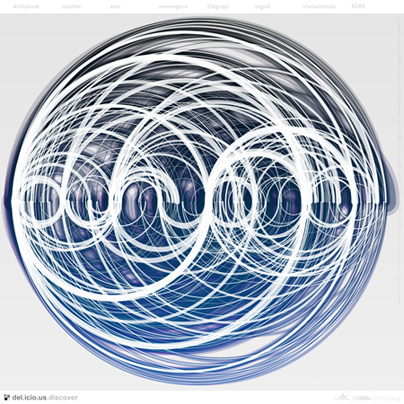| 01 | | | INTRO |
| 02 | | | GRAPHS |
| 03 | | | CONNECTIONS |
| 04 | | | ABSTRACTIONS |
| 05 | | | RECOMMENDATIONS |
| 06 | | | OUTTRO |
| 00 | » | beatspixelscodelife.com |
 06.01
06.01
 06.03
06.03

Many sites of course already utilize collaborative filtering for personalization/recommendations, but there are many other popular nodes where the application of these simple algorithms (or more complex collaborative filters would, I think, generate a very useful source of new, more precisely targeted suggestions. Here are just a few examples of other implementations:
In addition to the suggestions already made, more temporal aspects of the collective book-marking can be exploited. That is, it would be nice to know what other people have book-marked the same links recently as I, as I add a new link, or even to make predictions as to what I might like to see next based on what I've recently added.
toptaggers offers a list of helpful del.icio.us users, which ranks users based on their book-marking links with meaningful tags (as evidenced by others subsequently doing the same). It also offers a mechanism for suggesting users that, for a given user and tag, have the highest overlap. This is a great mechanism for finding the popular links and sources for new links, although it is tag-based and scores heavily on popularity.
Using essentially the same algorithm, one could find interesting photographer/photostreams or suggested photos. Every photo you add to your favorites is essentially the same as marking a del.icio.us book-mark. By considering the popularity of the photos that are in one's collection (or even the popularity of other photographer/photostreams in your network) the suggestion engine would work in the same manner.
Similarly, by considering one's blog to be a repository for 'favorite links' akin to a del.icio.us user's link-space, one could easily discover other blogs and bloggers that are on a similar wavelength. Again, by considering the popularity of the links that are shared, one can avoid just finding popular blogs and turn up ones that are relevant.
One could then imagine a simpler, yet more useful feature, where only the last N-days worth of links that you have blogged are considered, so suggestions are more aligned with your current subjects of interest.
Regardless of the complexity of the algorithms used to do the matching, the key issue is to begin to have the recommendations.
As nodes grow and become mature, the data that is collected as a function of the node's operation and user connections is usually extremely rich and deserves to be better utilized. "Social" bookmarking sites are hardly social in the conventional sense of the term, they are more often "collective" or "public" bookmarking sites; the challenge is to add more of the social aspects to them, for example by exploiting the power-law shape of the user-link spaces to make predictive suggestions.
I look forward to greater interaction between us all.